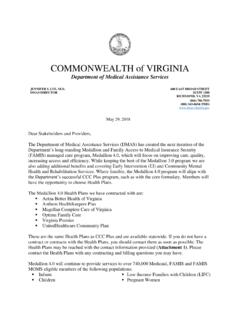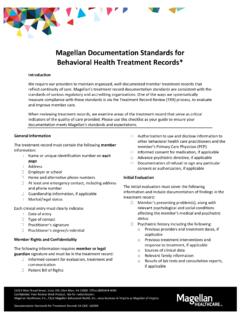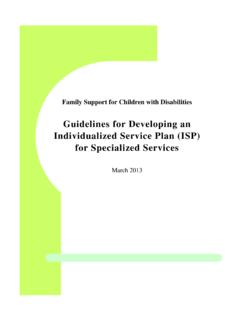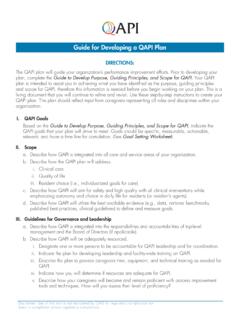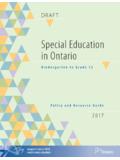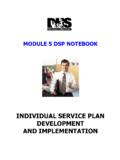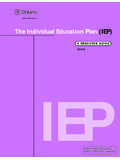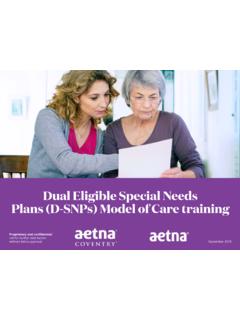Transcription of Person Centered Individual Service Plan
1 Person Centered Individual Service Planning presented by Cheryl DeHaven, Mgr. Recovery & Resiliency and Malinda Tiffany, LCSW Clinical Quality Liaison May 2016. Person Centered Individual Service Planning Presentation objectives Basic principles of the Person Centered Approach How to use the Person Centered Approach in writing the Individual Service plan [ISP]. At Assessment When developing and updating the Individual Service plan [ISP]. Goals, Objectives, and Interventions During Discharge Planning Using the Person Centered Approach in Service Coordination 2 Person Centered ISP training May 2016. Basic principles of the Person Centered Approach Too often the creation of the Individual Service plan or plan of care is not fully inclusive of the member. Healthcare professionals often make the mistake of: Assuming to know what is best for the client. Not sharing the assessment/diagnosis results.
2 Not communicating and making shared decisions. Dismissing the member's preferences and goals. Fostering dependency rather than self-reliance and recovery. Preparing the Service plan without the member/family. Why are these things a mistake? It invalidates the Person 's experiences, damages the relationship, and decreases the chances of a positive outcome of the treatment process. Use of a Person Centered approach has been shown to improve treatment outcomes for clients. 4 Person Centered ISP training May 2016. Tenets of the Person Centered Approach Emphasizes the uniqueness of each Person and each Person 's right to self- determination. Is based on the values of wellness, recovery, and hope. Views the relationship with the member / family as a partnership that supports the member's hopes, dreams, and goals. Creates a shared vision between the member and the provider. Is a process based on the member's / family's wishes and needs; not predetermined outcomes such as medication use, compliance, abstinence or stability.
3 Speaks in strengths based and recovery language. Believes in working together to identify barriers and roadblocks to reaching goals. These are considered to be things standing in the way rather than as a pathology. 5 Person Centered ISP training May 2016. Choose Your Words Carefully The words you use to write about mental health are very important, and can help reduce stigma around mental illness if carefully chosen. Focus on the Person , not the condition. The basic concept is that the mental health condition (or physical or other condition) is only one aspect of a Person 's life, not the defining characteristic. Preferred: She is a Person with schizophrenia. Not preferred: She is schizophrenic. Be specific. Mental illness is a general condition. Specific disorders are types of mental illness and should be used whenever possible. Preferred: He was diagnosed with bipolar disorder Not preferred: He was mentally ill Avoid derogatory language.
4 Terms such as psycho, crazy and junkie should not be used. In addition, avoid words like suffering or victim when discussing those who have mental health challenges. Preferred: She has a mental health illness. She has a substance use disorder. Not preferred: She suffers from mental illness. She's a drug abuser.. American Psychiatric Association (APA) . Words Matter: Reporting on Mental Health Conditions. Retrieved from 6 Person Centered ISP training May 2016. Treatment Planning for Person - Centered Care: The Road to Mental Health and Addiction Recovery authors Neal Adams, , , and Diane Grieder, the Person - Centered approach emphasizes the development of partnerships between clients and providers. All aspects of Person - Centered treatment planning rely on shared decision making and client-defined outcomes this process promotes client choice, empowerment, resilience, and self-reliance.
5 Rather than relying on cookie-cutter plans whose primary target is to reduce the symptoms that make up the client's diagnosis, Person - Centered treatment plans are holistic, are highly individualized, and identify positive outcomes based on clients'. strengths and available supports.. 7 Person Centered ISP training May 2016. Building a plan *Adams & Grieder Outcomes services Objectives Strengths/Barriers Goals Prioritization Understanding Assessment Request for services 8 Person Centered ISP training May 2016. How to use the Person Centered Approach in writing the Individual Service plan Person Centered Assessment The assessment process can be viewed as a journey of discovery for both the member and the provider. It is an opportunity to build a respectful, collaborative partnership that is the foundation for a Person Centered Service plan . Meets the member/family where they are Views the member/family as the expert on themselves Demonstrates a welcoming environment Values choice, self-determination, and empowerment Gathers information about the needs and preferences of the member as it relates to the delivery of the specific Service .
6 10 Person Centered ISP training May 2016. Person Centered Assessment [cont]. The following questions are provided as suggestions for initiating a strengths-based, Person - Centered dialog as part of the Assessment Process. Personal Strengths: , What are you most proud of in your life? What is one thing you would not change about yourself? What positive things would others say about you? Interests and Activities: , If you could plan the perfect day, what would it look like? What kinds of things would you be doing? What kinds of things do you like learning about? Living Environment: , What are the most important things to you when deciding where to live? Employment: , What would be your ideal job? What skills do you need to do this job? Which of these skills do you already have? Which skills do you need to develop? Trauma: , Tell me about experiences/relationships/people that make you feel safe/not safe.
7 What experiences/relationships/people have supported you to reach your personal goals? How have other experiences/relationships/people made it more difficult for you to reach your goals? Safety and Legal Issues: , Tell me about your experiences with the police and the legal system. How have the police been helpful/not helpful to you? Tell me about times you have had to go to court. Tell me about situations that make you feel safe/not safe. Financial: , What level of independence do you have in managing your finances? What skills, supports, or information do you need to be more independent? 11 Person Centered ISP training May 2016. Person Centered Assessment [cont]. Lifestyle and Health: , What is your health like? Tell me about the things you do that help you stay healthy. What are some things you would like to do to improve your health? Choice-Making: , What are some of the choices that you currently make in your life?
8 What choices would you like to make for yourself that others are making for you? If you could make these choices, what would you choose differently? Transportation: , How do you currently get from place to place? What would make travel easier/more affordable/less stressful for you? Faith and Spirituality: , How do you view the purpose of your life? What spiritual or faith-based activities do you participate in? In what ways are these helpful to you? Relationships and Important People: , Is there a Person in your life that you feel believes in you? Who is that Person ? In what ways does this Person convey this belief in you? Hopes and Dreams: , Tell me a bit about your hopes or dreams for the future. What are some hopes and dreams that you have let go of? Tell me about the dreams that have come true for you. What did you do to make these dreams come true? 12 Person Centered ISP training May 2016.
9 Person Centered Planning: Individual Service plan The ISP is a comprehensive and regularly updated document that integrates both physical and behavioral health, Service coordination and integrated care goals specific to the needs of the Individual being treated and meeting the defined specific Service requirements. [CMHRS manual Chap IV pg 17]. Is based on the understanding of the Person gained during the assessment Is the road map for the work to be done by the member, family, and provider Emphasis in Person Centered Service planning is on the strengths and preferences of the member rather than the problems or the deficits. Use of the member's strengths is how life goals and dreams will be achieved Barriers are the roadblocks that interfere with achievement of the goals. Barriers are not the exclusive focus of the plan . Focuses on the member's life vision by incorporating his/her hopes, dreams, and goals.
10 13 Person Centered ISP training May 2016. Person Centered Planning: Individual Service plan [cont.]. As emphasized in the Psychiatric services Provider Manual [Chap IV, pages 7-9], it is critical that the Initial plan of Care and the Comprehensive Individual plan of Care [CIPOC] be developed by a team of professionals in consultation with the Individual and the Individual 's parents, legal guardians, or others in whose care the Individual will be released after discharge. Participation in the specific Service should not be a goal or objective when writing the Individual Service plan . However with Therapeutic Foster Case Management [TFC-CM], a provider's program of therapies, activities, and services should be documented in the individualized comprehensive treatment plan [Psychiatric services Provider manual Chap IV page 20], including The specific methods of program therapies, activities, and services , The specific methods of interventions and strategies designed to meet the above goals and objectives Describing how the provider is working with related community resources to ensure a continuity of care with the Individual 's family, school, and community One of the requirements in written progress Reports for TFC-CM is including The Individual 's assessment of his or her progress and his or her descriptions of services needed, where appropriate.

